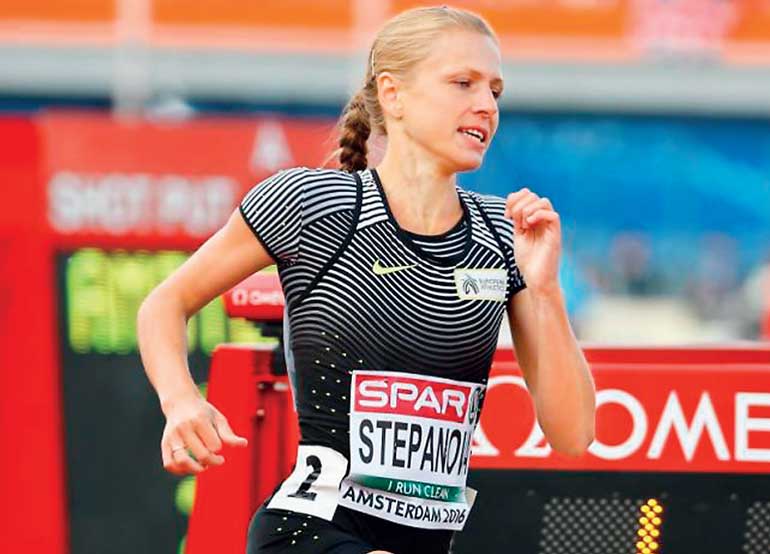Friday Feb 20, 2026
Friday Feb 20, 2026
Wednesday, 27 July 2016 00:00 - - {{hitsCtrl.values.hits}}
 REUTERS: A Russian whistleblower who helped uncover the biggest doping scandal in decades has told Reuters that the International Olympic Committee (IOC) is more concerned about protecting the organisation than ridding world sport of drugs cheats.
REUTERS: A Russian whistleblower who helped uncover the biggest doping scandal in decades has told Reuters that the International Olympic Committee (IOC) is more concerned about protecting the organisation than ridding world sport of drugs cheats.
A day after the IOC rejected a request by his wife, former Russian drugs cheat Yulia Stepanova, to run in the Rio Games as an independent athlete, Vitaly Stepanov said an invite to attend the Rio Games as spectators felt like they were being bought.
The IOC decided on Sunday not to impose a blanket ban on Russian athletes due to the country’s doping history, allowing sports federations to decide on individual cases.
However, it said athletes who have been sanctioned in the past for doping would not be eligible for Rio.
“My personal view, from the communications we had with people from the IOC, those people had no interest in clean sport,” Stepanov said in a telephone interview.
“I got the impression the only thing they cared about, even the person from the ethics department, is protecting the IOC as an organisation.”
Stepanov, who previously worked for Russia’s anti-doping agency, and his wife helped expose the doping scandal which threatened to exclude Russia from the Olympics.
The couple now live in an undisclosed location in the United States, fearful for their lives.
Stepanov said the invitation to travel to Rio to watch the Games left them cold.
“I felt like, ‘Are you trying to buy us?’” he said.
“Is that how IOC treats whistleblowers? Make them quiet by giving them IOC accreditation and access to VIP lounges.”
A spokesman for the IOC could not be reached late on Monday for comment.
The IOC’s decision not to impose a blanket ban on Russian athletes from the Rio Games, a ban which was requested by the World Anti-Doping Agency (WADA), showed “the IOC is not a leader in sport movement,” Stepanov said.
“It says strong words but it acts weak.”
The couple have asked the IOC executive board (IOC EB) to review its decision.
“(We) cannot but be very disappointed that the IOC EB has obviously not been given the correct information by the IOC Ethics Commission,” they said in a letter to IOC Director General Christophe de Kepper.
Stepanov’s wife continues to train and was still hoping the IOC might change its mind, he said.
“She will never win another medal. It’s more about her participating and trying to see how fast she can run by being an honest athlete,” he added.
The IOC recognised Stepanova’s testimony and public statements as having “made a contribution to the protection and promotion of clean athletes, fair play and the integrity and authenticity of sport, the Rules of the Olympic Charter related to the organisation of the Olympic Games run counter to the recognition of the status of neutral athletes.”
However, it also said neither she nor any Russian athlete with a doping past would be eligible for the Games.
Stepanov said he had never talked to IOC President Thomas Bach about the case. “Just one email exchange,” he said. There also had been “just one, one-hour conversation with one person from IOC Ethics Commission,” he added.
“They write things like zero tolerance in doping but you don’t get that impression when you talk to people from IOC.”
Doping would never be brought under control “until IOC members start caring about clean athletes and about clean sport and competition,” Stepanov said.
He cautioned that the IOC’s stance on Russia was a green light to others engaged in doping.
“If you are doping in a system that is similar to Russia, continue doing so because there is no reason to fight it because in the end the IOC will say they will not punish the system, but we will punish the whistleblower,” he said.
REUTERS: Five Russian canoe sprint athletes – including the 2012 Olympic champion Alexander Dyachenko – have been banned from competing at next month’s Rio Olympics by the International Canoe Federation (ICF), after they were implicated by the McLaren report.
Dyachenko, European Champion Andrey Kraitor, Olympic bronze medallist Alexey Korovashkov along with Elena Aniushina and Natalia Podolskaia have been banned, the ICF said on Tuesday.
The International Olympic Committee on Sunday opted against a blanket ban on Russian athletes for the Aug.5-21 Games after evidence of state-sponsored doping of Russian athletes in the 2014 Sochi Olympics.
The IOC passed the baton to the international federations to clear individual athletes.
“This is a bitter blow for the Olympic movement and we are saddened that our sport in implicated,” Simon Toulson, the ICF secretary general said in a statement. “We have taken swift action and removed all offending athletes where doping evidence exists.” The ICF added that it will not impose a federation wide ban for Russia, and issued immediate suspensions to the implicated athletes pending further investigation.